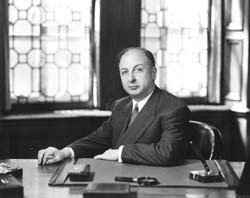
Samuel Bronfman, was a Canadian businessman, philanthropist, and member of the Canadian Bronfman family. He founded Distillers Corporation Limited and purchased the Seagram Company, that became the world’s largest liquor distilling firm.
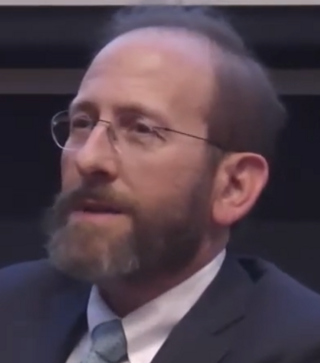
The president of Harvard University is the chief administrator of Harvard University and the ex officio president of the Harvard Corporation. Each is appointed by and is responsible to the other members of that body, who delegate to the president the day-to-day running of the university.

Adolphus Busch Hall is a Harvard University building located at 27 Kirkland Street in Cambridge, Massachusetts. It is named for brewer and philanthropist Adolphus Busch, former president of the Anheuser-Busch company, who contributed $265,000 to its building fund.
Stanley Hoffmann was a French political scientist and the Paul and Catherine Buttenwieser University Professor at Harvard University, specializing in French politics and society, European politics, U.S. foreign policy, and international relations.
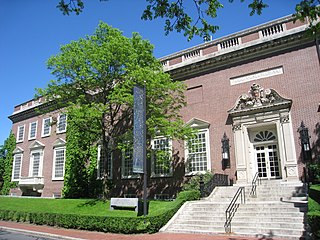
The Harvard Art Museums are part of Harvard University and comprise three museums: the Fogg Museum, the Busch-Reisinger Museum, and the Arthur M. Sackler Museum, and four research centers: the Archaeological Exploration of Sardis, the Center for the Technical Study of Modern Art, the Harvard Art Museums Archives, and the Straus Center for Conservation and Technical Studies. The three museums that constitute the Harvard Art Museums were initially integrated into a single institution under the name Harvard University Art Museums in 1983. The word "University" was dropped from the institutional name in 2008.
Saidye Rosner Bronfman was a Canadian-Jewish philanthropist. Her husband, Samuel Bronfman (1891–1971), purchased Joseph E. Seagram and Sons Limited, that became the Seagram Company. The family took a leading role in the Canadian-Jewish community.
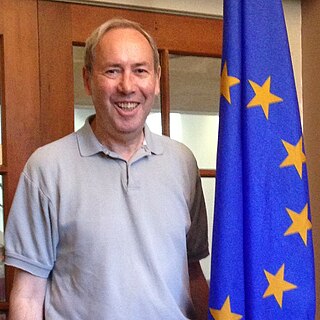
David Gordon Blackbourn is Cornelius Vanderbilt distinguished chair of history at Vanderbilt University, where he teaches modern German and European history. Prior to arriving at Vanderbilt, Blackbourn was Coolidge Professor of history at Harvard University.

Steven Levitsky is an American political scientist currently serving as a professor of government at Harvard University and a senior fellow for democracy at the Council on Foreign Relations.
Prep for Prep is a leadership development and gifted education program dedicated to expanding educational access to students of color. The organization's programs are targeted toward high achieving New York City minority students and helps with scholarships placement into many of the most respected secondary schools and colleges in the country.
Grzegorz Ekiert is Laurence A. Tisch Professor of Government at Harvard University, former Director of Minda de Gunzburg Center for European Studies (2012-2024), former Chair of undergraduate concentration in Social Studies (2000-2006) and Senior Scholar at the Harvard Academy for International and Area Studies. His teaching and research interests focus on comparative politics, regime change and democratization, civil society and social movements, and East European politics and societies.

The Peninsula New York is a historic luxury hotel at the corner of Fifth Avenue and 55th Street in the Midtown Manhattan neighborhood of New York City. Built in 1905 as the Gotham Hotel, the structure was designed by Hiss and Weekes in the neoclassical style. The hotel is part of the Peninsula Hotels group, which is owned by Hongkong and Shanghai Hotels (HSH). The structure is 23 stories high and, as of 2022, contains 241 rooms.

Alexander Görlach is a German academic, author and columnist. He currently serves as visiting scholar at the philosophy department of New York University and adjunct professor to NYU Gallatin School where he teaches democratic theory. Prior to that he was a senior fellow at the Carnegie Council for Ethics in International Affairs and a visiting scholar at Harvard University.
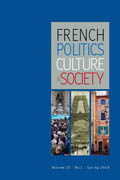
French Politics, Culture & Society is a peer-reviewed academic journal published by Berghahn Books on behalf of the Conference Group on French Politics & Society. It covers modern and contemporary France from the perspectives of the social sciences, history, and cultural analysis. It also explores the relationship of France to the rest of the world, especially Europe, the United States, and the former French colonies. The editor-in-chief is Herrick Chapman.
Matthew Bronfman is an American businessman, entrepreneur and philanthropist. A member of the Bronfman family, he is the son of prominent businessman and philanthropist Edgar Bronfman, Sr.
Cemp Investments was the primary holding company and investment vehicle for, and named after, the four children of Samuel Bronfman: Charles Bronfman, Edgar Bronfman, Aileen "Minda" Bronfman de Gunzburg, and Phyllis Lambert, also known as the Montreal branch of the Bronfman family. Cemp became one of the largest privately owned companies in Canada. At its peak, it controlled tens of billions in dollars of assets in major distilling, commercial real estate development, oil and gas, and entertainment companies across North America.

How Democracies Die is a 2018 comparative politics book by the Harvard University political scientists Steven Levitsky and Daniel Ziblatt about democratic backsliding and how elected leaders can gradually subvert the democratic process to increase their power. The book also offers stark warnings about the impact of the Republican Party and Donald Trump's presidency on U.S. democracy.
Guido Goldman was a Swiss-born American academic and philanthropist known for advancing post–World War II US-Germany academic and cultural relations. He was a co-founder of the German Marshall Fund and also set up the Center for European Studies at Harvard University.
Mark Newman Franklin is a political scientist specializing in voting and elections. Since September 2006, Franklin had been the inaugural Stein Rokkan Professor of Comparative Politics at the European University Institute (EUI) until he retired in 2011. He is the founder of the Public Opinion and Participation Section of the European Union Studies Association, and was the President of the European Politics and Society section of the American Political Science Association. He was John R. Reitemeyer Professor Emeritus of International Politics at Trinity College until he retired in 2007 and Local Affiliate at Minda de Gunzburg Center for European Studies, Harvard University. He got his BA and MA from University of Oxford. In 1970, he competed his PhD at the Cornell University.
In 1975, Samuel Bronfman II, the 21-year-old heir to the Bronfman family trust then worth $750 million, was kidnapped after a gathering in Yorktown Heights, New York, and held for ransom. His kidnappers were caught and the ransom recovered, but the defendants' attorneys mounted a defense that argued Bronfman had been a co-conspirator, and the abductors were only convicted of extortion, not kidnapping. The defense attorney confessed in 2020 that he had been aware the defense was a lie and that Bronfman had been an innocent victim.

Gerasimos Tsourapas is a Professor of International Relations at the University of Glasgow. He currently serves as the Chair of the Ethnicity, Nationalism, and Migration Section of the International Studies Association and is the Editor-in-Chief of Migration Studies. His main areas of research and teaching are the politics of migrants, refugees, and diasporas, with particular expertise on cross-border mobility across the Global South.











